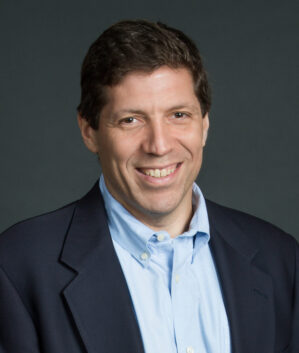Wharton Sports Analytics and Business Initiative
News
The Wharton Moneyball Podcast Celebrates its 10-Year Anniversary
Wharton Moneyball – the popular Sirius XM radio show hosted by Eric Bradlow, Vice Dean of Analytics at Wharton, Shane Jensen, Professor of Statistics and Data Science, Cade Massey, Faculty Director of the Wharton People Lab, and Adi Wyner, Faculty Co-Director of the Wharton Sports Analytics and Business Initiative – celebrates its 10-year anniversary this March, marking a decade of insightful, free-flowing, and data-backed conversations about the world of sports and statistics. To celebrate, the group got together to chat about their memories of the past and ambitions for the show’s future.
When Bradlow approached the group with the idea of starting this show way back in 2014, the sports landscape looked considerably different than the one we enjoy today. The Seattle Seahawks had just blown out Peyton Manning’s Denver Broncos to secure their first Super Bowl title in franchise history. Caitlin Clark was starting middle school, LeBron was still with the Miami Heat, and home-team Russia won the most medals at the Winter Olympics in Sochi.
The change in sports over the past decade also includes a greater appreciation of data analytics. During their 10-year anniversary podcast episode, Wharton Moneyball co-hosts observed that the ubiquity of data and its ever-increasing value to every type of business helped tremendously in bolstering interest and investment in sports analytics.
“If you go back to the original Moneyball,” Bradlow said, citing Oakland Athletics manager Billy Beane’s famous introduction of advanced analytics to inform roster construction in 2002, “it was mainly about on-field stuff. Now, [sports analytics] is also about the business of sports. It’s about trying to understand sleep and training patterns. The problems have grown so diverse, and that’s the part that’s exciting to me.” Bradlow also cited how his consulting work with the Philadelphia Eagles – originally concerned with on-field strategy – eventually caught the attention of the business side of the organization, too.
Jensen remarked how even people’s attitudes on the topic have changed in a meaningful way. “I no longer have to explain to people why I’m a statistician or why I work with data. I think sports has become ‘cool’ within the statistical academic community.”
As the sports and data landscapes changed, so too did the Wharton Moneyball hosts. “I remember being nervous,” said Wyner. “Our very first show was a live broadcast. I didn’t know how we were going to fill two hours.” At the time, Wyner had a passion for all sports, but baseball was the sole domain of his sports analytics expertise. He worried that his lack of extensive knowledge elsewhere could be a hinderance for the show. In reality, it served as a valuable counterbalance.
“[This show] taught me the power of doing a little bit of something on a regular basis…the cumulative effect in terms of what I know, my relationship with y’all, the people in the industry, it’s amazing.”
Cade Massey, Faculty Director, Wharton People Lab
“I may not know anything about golf, but I can contribute by asking what’s the mean, what’s the standard deviation, what does a typical player do in these situations?” said Wyner. “Sometimes I’ve found that my lack of knowledge about a sport works very well with the experts, because it brings you back to earth. It stops you from over-telling the story and forces you to ask a question. After a while we figured out, we can fill two hours, no problem.”
Massey, who served as the unofficial moderator for the group’s retrospective, remarked that the show has taught him “the power of doing a little bit of something on a regular basis…the cumulative effect in terms of what I know, my relationship with y’all, the people in the industry, it’s amazing.”
Since the show’s inception, Wharton Moneyball has accrued an impressive and sometimes unexpected array of guests. Pitching coach Rick Peterson, poker star Annie Duke, golf instructor Scott Fawcett, and Super Bowl Champion Justin Tuck, WG’18, each gave the hosts an inside glimpse into their sport that the statistics of a game could never reveal.
Peterson provided the group with a compelling answer to the question of why baseball teams don’t always bring in their relief pitchers during high-leverage moments – a trend that confounded Moneyball hosts and general fans alike. It takes a while to get relief pitchers ready, and if you put one through the warmup process and don’t end using them in the game, either due to the current pitcher finding success or something else, Peterson explained, then you’ve put the pitcher through a strenuous warm up process for no reason, and they may be resting the next time you need them. “I remember feeling really schooled by an actual baseball professional,” said Wyner. “It was a real egghead moment,” added a smiling Jensen.
“I figured if I’m having fun, the audience is having fun. Part of the reason I brought this group together is that we were going to have fun no matter what, talking about sports and statistics.”
Eric Bradlow, Vice Dean of Analytics at Wharton
During their reflection, the co-hosts agreed that the COVID-19 pandemic in 2020 marked a significant era in the show’s lifespan. “There was this moment in time where we were pretty much full-time COVID analysts,” said Massey. “For three months, there were no sports to talk about.” Instead, Bradlow, Jensen, Massey, and Wyner would spend the first 30 minutes of the show discussing the latest COVID developments from a statistics perspective. They would use their expertise in modeling, forecasting, predictions, and more to help their listeners make sense of trending developments and new batches of data from the Center for Disease Control (CDC). In some ways, their work provided a sense of order and logic to troublingly uncertain times.
While the world around Wharton Moneyball changed, the show’s sense of fun and exploration endured. Throughout the course of Wharton Moneyball’s history – and certainly during their 10-year anniversary podcast – Bradlow has borne the brunt of his co-host’s friendly-but-persistent ridicule for insisting momentum, a statistically rare phenomenon in sports, plays a meaningful factor in a team’s ability to perform well. It’s something Bradlow believes shouldn’t be ignored completely when making projections.
And, if you want to bring up competitive eating and the sport’s 15-time champion, Joey Chestnut, just make sure Massey isn’t in the room. “I just want to say for our listeners here – hot dog eating is a real sport,” said Bradlow, who has a credible shot at being the IFOCE’s (International Federation of Competitive Eating) biggest fan. “You have to admire someone whose exceedance is so far greater than everybody else…and when [Chestnut] came on the air and talked about his training methods and everything else? These are real scientists working here!”
“Any other favorite moments of the show?” asked Massey, looking for a way out.
Looking ahead, the fun these four have doesn’t appear to be stopping any time soon. A potential road trip to the American sport halls of fame, emergent technologies like AI and temporal-spatial data, and new generations of statistical superstars like Patrick Mahomes, Caitlin Clark, and Coco Gauff help to ensure Wharton Moneyball will be blazing through its time-slot on air for years to come.
“I figured if I’m having fun, the audience is having fun,” said Bradlow. “That’s always been my motto for teaching as well. Part of the reason I brought this group together is that we were going to have fun no matter what, talking about sports and statistics.”




